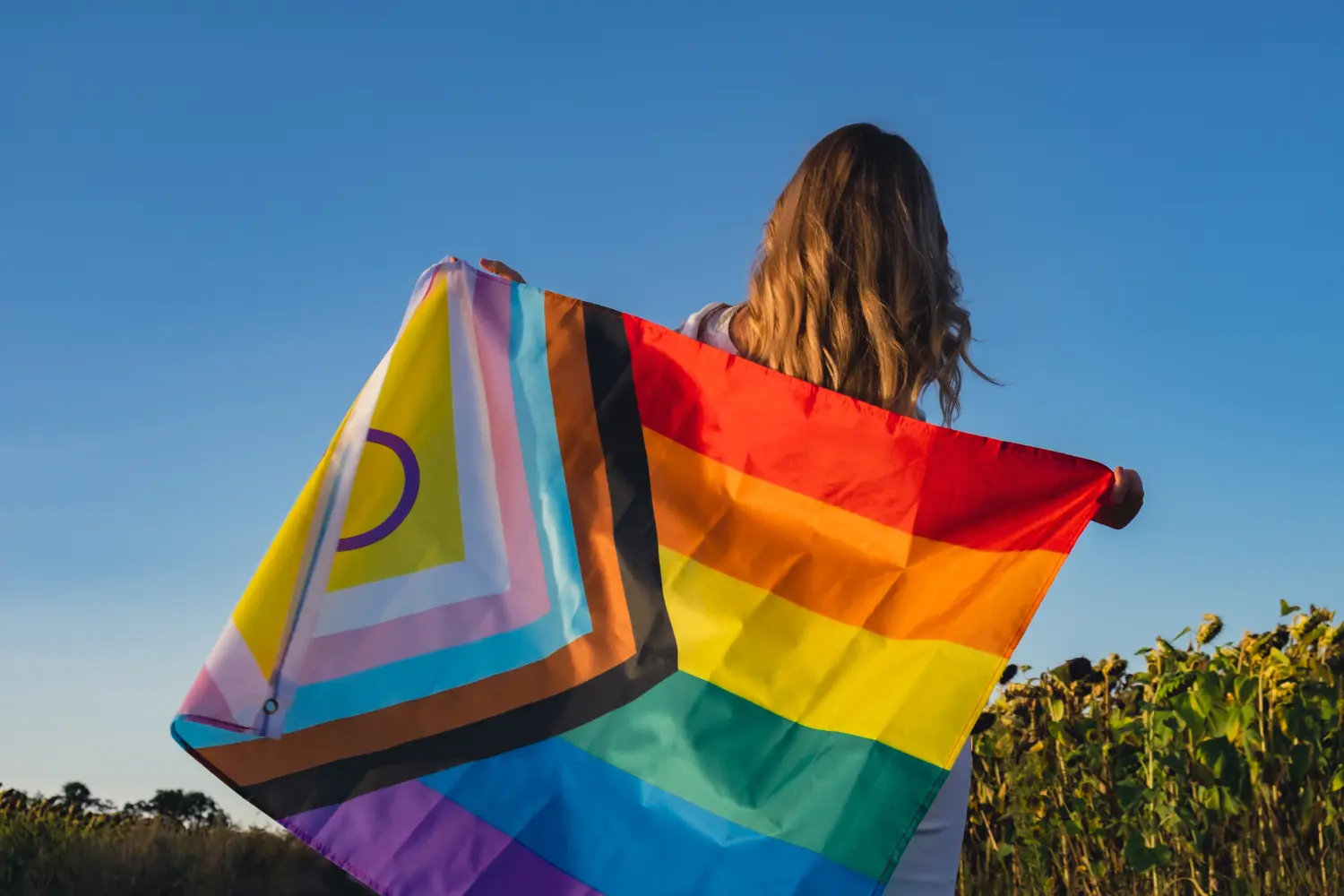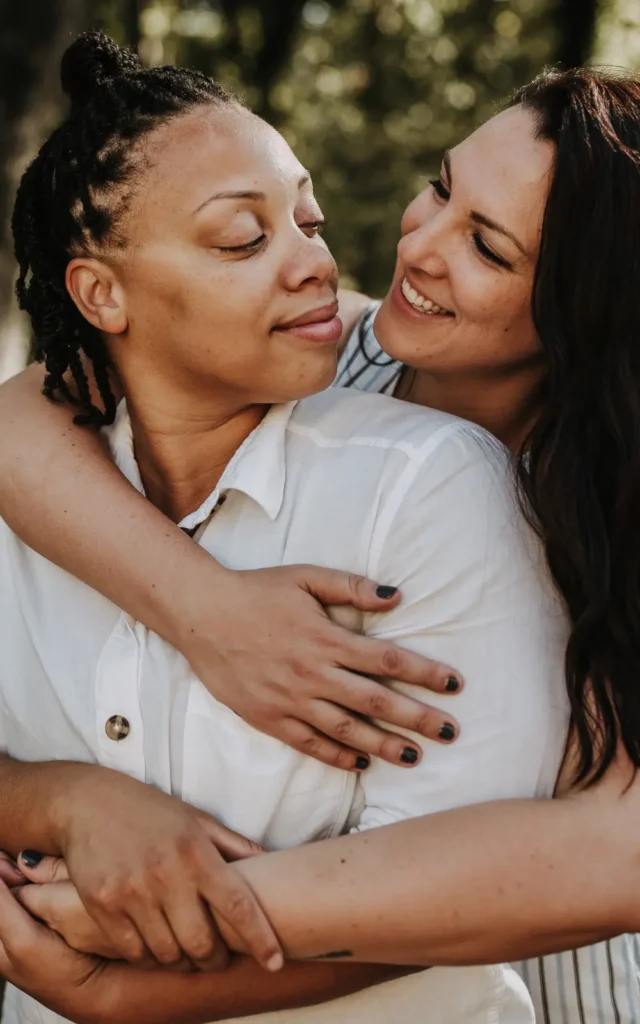
LGBTQ Rehab Centers on Long Island, New York
Inclusive, Comprehensive Care for Addiction and Dual Diagnosis Issues

Access the Care You Deserve at Wellbridge
Accessing inclusive care for addiction recovery is important, particularly for those within the LGBTQ community.[1] At Wellbridge—located on Long Island, New York—we recognize the significance of providing tailored support that respects and embraces diverse identities.
Our rehab center offers a sanctuary where you can embark on your journey to sobriety without fear of judgment or discrimination. We understand the unique challenges faced by LGBTQIA+ individuals in seeking treatment and are dedicated to providing an environment of acceptance, understanding, and empowerment.
Through comprehensive programs and compassionate care, Wellbridge strives to empower every one of our patients to reclaim control of their lives and thrive in their journey toward healing and recovery. Our approach integrates evidence-based therapies with specialized support for LGBTQ individuals, addressing not only addiction but also the complex interplay of social, emotional, and psychological factors that contribute to substance use disorders.
At Wellbridge, we believe that every person deserves the opportunity to live a fulfilling and authentic life, free from the burden of addiction, and we are committed to providing the resources and support necessary to make that a reality for members of the LGBTQ community on Long Island, in New York state, and beyond.
What Barriers Can Members of the LGBTQ Community Face Regarding Addiction Treatment?
Members of the LGBTQ community often encounter unique barriers when seeking addiction treatment, stemming from a range of social, cultural, and systemic factors.[2] The pervasive stigma and discrimination experienced by LGBTQ individuals can lead to a reluctance to seek help due to fear of judgment or rejection. Many LGBTQ individuals have faced discrimination or trauma related to their sexual orientation, gender identity, or expression—which can exacerbate feelings of shame and isolation, making it challenging to reach out for support.
Moreover, the lack of LGBTQIA+-specific resources and culturally competent care within traditional addiction treatment centers presents another challenge.[3] Many treatment facilities may not be equipped to address the specific needs and experiences of LGBTQIA+ individuals, leading to feelings of alienation or discomfort. Concerns about confidentiality and safety may arise, particularly for transgender and gender non-conforming individuals who may fear mistreatment or discrimination in gender-segregated spaces.
Socioeconomic factors can pose barriers to access as well, as LGBTQIA+ individuals are more likely to experience poverty, homelessness, and unemployment compared to their cisgender and heterosexual counterparts. These disparities can limit access to quality healthcare, including addiction treatment services, further perpetuating cycles of addiction and marginalization.
Learn More About Our ProgramsThe Importance of LGBTQIA+ Inclusive Addiction Treatment
Inclusive addiction treatment for LGBTQIA+ individuals isn’t just a matter of preference; it’s a necessity rooted in the unique experiences and challenges faced by this community. LGBTQIA+ people often encounter discrimination, social stigma, and marginalization, which can exacerbate feelings of isolation and contribute to substance abuse as a coping mechanism.[4] Therefore, having access to treatment that acknowledges and respects their identities is critical for effective and sustainable recovery.
Traditional treatment settings may not adequately address the specific needs of LGBTQIA+ individuals, leading to barriers to seeking help and engaging in the recovery process. LGBTQIA+-specific treatment programs provide a safe and supportive environment where individuals can openly discuss their experiences without fear of judgment or discrimination. These programs are staffed by professionals who have received training in LGBTQ issues and are equipped to provide culturally competent care.
Moreover, LGBTQIA+ inclusive rehab programs recognize the interconnectedness of addiction and mental health within this community.[5] Many LGBTQIA+ individuals face higher rates of mental health disorders, such as depression and anxiety, which can contribute to substance use. Inclusive treatment programs offer integrated care that addresses both addiction and mental health needs, ensuring a comprehensive approach to recovery.
By prioritizing inclusivity and diversity in addiction treatment, we not only improve outcomes for LGBTQIA+ individuals but also promote a more equitable and just healthcare system. Everyone deserves access to treatment that honors their identity and experiences, and LGBTQIA+-inclusive addiction treatment is a vital step toward achieving that goal.
Is our LGBTQIA+ program right for you or a loved one? Reach out now.How Can LGBTQ-Inclusive Care Improve Your Recovery Experience?
LGBTQ-inclusive care can significantly enhance the recovery and wellness experience for individuals within the LGBTQIA+ community in several ways:[6]
- Validation and acceptance: Inclusive care environments provide a sense of validation and acceptance for LGBTQIA+ individuals, acknowledging and affirming their identities without judgment or discrimination. This acceptance can foster a sense of belonging and safety, encouraging individuals to be more open and honest about their experiences and challenges with addiction.
- Cultural competency: LGBTQ-inclusive care facilities often have staff members who are trained in LGBTQIA+ issues and understand the unique needs and concerns of this community. This cultural competency allows for more effective communication and rapport-building between clients and treatment providers, leading to better treatment outcomes.
- Tailored treatment approaches: Inclusive care recognizes that LGBTQIA+ individuals may have specific needs and experiences related to their identities, which can impact their addiction and recovery journey. Treatment programs that are tailored to address these unique factors, such as minority stress, trauma related to discrimination, or challenges related to coming out, are more likely to resonate with LGBTQIA+ individuals and support their long-term recovery goals.
- Community support: Inclusive care environments provide opportunities for LGBTQIA+ individuals to connect with peers who share similar experiences and identities. Building a supportive community of fellow LGBTQIA+ individuals can offer invaluable encouragement, solidarity, and understanding throughout the recovery process.
- Reducing the stigma: LGBTQIA+-inclusive care environments help to reduce the stigma and shame often associated with addiction within the LGBTQ community. By fostering an atmosphere of acceptance and understanding, individuals feel more empowered to address their substance use issues without fear of being ostracized or judged by others.
Frequently Asked Questions About LGBTQ Substance Abuse Treatment Centers
How do LGBTQ rehab centers address the unique needs of LGBTQIA+ individuals?
LGBTQ rehab centers are specifically designed to address the unique challenges and needs of LGBTQIA+ individuals in addiction recovery. They provide a safe and affirming environment where individuals can openly discuss their identities and experiences without fear of judgment or discrimination. These centers often offer specialized programming and therapy tailored to address issues such as minority stress, trauma related to discrimination, and challenges related to the coming out process.
What should I expect during my stay at an LGBTQ rehab center?
During your stay at an LGBTQ rehab center, you can expect to participate in a structured treatment program that may include individual therapy, group therapy, support groups, educational sessions, and holistic activities. The focus will be on addressing both addiction and any underlying issues related to sexual orientation, gender identity, or expression in a supportive and inclusive environment.
How long do programs at LGBTQ rehab centers typically last?
The duration of programs at LGBTQIA+ detox and rehab centers can vary depending on the individual’s needs and the specific treatment facility. Some programs may last for 28 days, while others may offer longer-term options such as 60 or 90 days, depending on your treatment plan, aftercare, and relapse prevention needs.
What should I look for when choosing an LGBTQ residential treatment center?
When choosing an LGBTQ drug rehab center, it’s important to look for facilities that prioritize inclusivity, cultural competency, and tailored support for LGBTQIA+ individuals. Consider factors such as the qualifications and training of staff members, the levels of care they offer, the types of therapy and programs offered, the facility’s approach to LGBTQ-specific issues, and the overall environment and atmosphere of the center, as well as things such as whether or not your health insurance plan is accepted.
Will I be required to disclose my sexual orientation or gender identity at an LGBTQ rehab center?
Disclosure of sexual orientation or gender identity at an LGBTQIA+ rehabilitation center is typically voluntary and confidential. While some individuals may feel comfortable sharing this information as part of their treatment process, others may choose to keep it private. LGBTQ rehab centers prioritize creating a safe and respectful environment where individuals can feel empowered to share as much or as little as they are comfortable with.
Can LGBTQ rehab centers accommodate individuals with co-occurring mental health disorders?
Yes, many LGBTQIA+ recovery programs are equipped to address co-occurring behavioral health concerns (known as co-occurring disorders) alongside drug addiction issues. These facilities may offer integrated treatment programs that address both addiction and mental health issues simultaneously, providing comprehensive care to support individuals in their recovery journey.
Sources
[1] National Institute on Drug Abuse. (2017). Substance use and SUDs in LGBTQ populations. National Institute on Drug Abuse. https://nida.nih.gov/research-topics/substance-use-suds-in-lgbtq-populations on May 7, 2024
[2] SAMHSA. (2023, June 6). SAMHSA Releases New Data on Lesbian, Gay, and Bisexual Behavioral Health. Www.samhsa.gov. https://www.samhsa.gov/newsroom/press-announcements/20230613/samhsa-releases-new-data-lesbian-gay-bisexual-behavioral-health on May 7, 2024
[3] Williams, N. D., & Fish, J. N. (2020). The availability of LGBT‐specific mental health and substance abuse treatment in the United States. Health Services Research, 55(6), 932–943. https://doi.org/10.1111/1475-6773.13559 on May 7, 2024
[4] Paschen-Wolff, M. M., DeSousa, A., Emily Allen Paine, Hughes, T. L., & Aimee N.C. Campbell. (2024). Experiences of and recommendations for LGBTQ+-affirming substance use services: an exploratory qualitative descriptive study with LGBTQ+ people who use opioids and other drugs. Substance Abuse Treatment, Prevention, and Policy, 19(1). https://doi.org/10.1186/s13011-023-00581-8 on May 7, 2024
[5] Felner, J. K., Haley, S. J., Jun, H.-J., Wisdom, J. P., Katuska, L., & Corliss, H. L. (2021). Sexual orientation and gender identity disparities in co-occurring depressive symptoms and probable substance use disorders in a national cohort of young adults. Addictive Behaviors, 106817. https://doi.org/10.1016/j.addbeh.2021.106817 on May 7, 2024
[6] Paschen-Wolff, M. M., DeSousa, A., Emily Allen Paine, Hughes, T. L., & Aimee N.C. Campbell. (2024). Experiences of and recommendations for LGBTQ+-affirming substance use services: an exploratory qualitative descriptive study with LGBTQ+ people who use opioids and other drugs. Substance Abuse Treatment, Prevention, and Policy, 19(1). https://doi.org/10.1186/s13011-023-00581-8 on May 7, 2024
Find Hope and Healing With Inclusive Care
You deserve compassion and understanding in the recovery journey. Wellbridge is proud to offer LGBTQ addiction treatment on Long Island with inclusive care that celebrates your identity and provides tailored support for your unique needs.